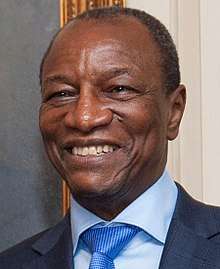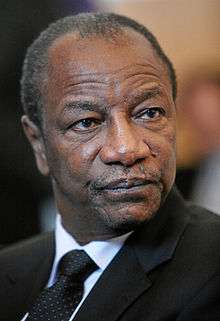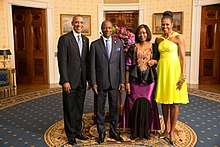Alpha Condé
Alpha Condé (born 4 March 1938) is a Guinean politician who has been President of Guinea since December 2010. He spent decades in opposition to a succession of regimes in Guinea, unsuccessfully running against President Lansana Conté in the 1993 and 1998 presidential elections and leading the Rally of the Guinean People (RPG), an opposition party. Standing again in the 2010 presidential election, Condé was elected president in a second round of voting. When he took office that December, he became the first freely elected president in the country's history. Condé was reelected in 2015 with about 58% of the vote.[2]
Alpha Condé | |
|---|---|
 | |
| 4th President of Guinea | |
| Assumed office 21 December 2010 | |
| Prime Minister | Jean-Marie Doré Mohamed Said Fofana Mamady Youla Ibrahima Kassory Fofana |
| Preceded by | Sékouba Konaté (Acting) |
| Chairperson of the African Union[1] | |
| In office 30 January 2017 – 28 January 2018 | |
| Preceded by | Idriss Déby |
| Succeeded by | Paul Kagame |
| Personal details | |
| Born | 4 March 1938 Boké, French Guinea, French West Africa (now Guinea) |
| Political party | Rally of the Guinean People |
| Spouse(s) | Djene Kaba Condé |
| Alma mater | Sciences Po, Pantheon-Sorbonne University |
| Religion | Islam |
| Ethnic Group | Mandinka |
Upon his election in 2010, Condé said he would strengthen Guinea as a democracy and fight corruption,[3] but he and his son have since been implicated in a number of corruption scandals, mostly related to the mining industry,[4][5] and suspected of election rigging.[6]
On 30 January 2017, Condé succeeded Chad's Idriss Déby as head of the African Union.[7] He was succeeded by Rwandan President Paul Kagame on 28 January 2018.[8]
Early life
Condé was born on 4 March 1938 in Boke in Lower Guinea. His parents were from Baro, a small town in Kouroussa Prefecture in the Kankan Region of Upper Guinea.[9]
Condé left for France at the age of 15. He was active in the National Union of Higher Education (SNESUP), the Association of Guinean students in France (AEGF), and the Federation of Black African Students in France (FEANF), of which he was the Executive Coordinator of African National Groups (NG) from 1967 to 1975, overseeing the activities of the Directorate of FEANF.
Condé wrote a master's thesis in political science, Le P.D.G. et le peuple de Guinée, in 1965.[10]
Political career

Condé won 19.6 percent of the vote in Guinea's first multiparty presidential election, held on 19 December 1993. Lansana Conté, who had been president since a bloodless 1984 coup d'etat, won that election with 51.7 percent of the vote. Condé's supporters alleged fraud in this election after the Supreme Court nullified results in the Kankan and Siguiri prefectures, where Condé had received more than 90 percent of the vote.[11] In the 1998 presidential election, Condé ran again and received 17.6 percent of the vote, placing third behind Conté (56.1 percent) and Mamadou Boye Bâ (24.6 percent). On 16 December, two days after the poll, Condé was arrested and charged with trying to leave the country illegally; he was also charged with attempting to recruit forces to destabilize the government.[11]
Controversy during his detention focused on whether he could be represented by foreign as well as domestic lawyers, and whether defense lawyers were being given full access to him in jail. Condé's trial, initially scheduled to begin in September 1999, did not begin until April 2000. Condé, along with 47 co-defendants, was charged with hiring mercenaries, planning to assassinate President Conté, and upsetting the state's security. Defense lawyers began by calling for the judge to immediately release their clients, then quit, saying that under the circumstances they could not properly make a defense. The trial was thus delayed several times, during which time Condé refused to speak in court, and his co-defendants denied all of the charges. The trial finally continued in August, and in mid-September Condé was sentenced to jail for five years.[11]
However, Condé was released in May 2001 when he was pardoned by President Conté, with the condition that he was prohibited from engaging in political activities.[11] Following his release, he left Guinea for France, returning in July 2005.[12] Upon his return, some reports indicated that he intended to organize the RPG for the municipal elections held in late 2005, but later stated his intention to boycott them.[13]
Following Conté's death and the 23 December 2008 military coup, Condé met with Moussa Dadis Camara, the President of the National Council for Democracy and Development (CNDD), on 27 December 2008. After the meeting, Condé said that the members of the CNDD junta were "patriots".[14] Later, however, he opposed the junta and was criticised by Camara.[15]
2010 election
Condé stood again in the June–November 2010 presidential election. During the first round, he received 18 percent of the votes, while Cellou Dalein Diallo placed first with over 40 percent. On 15 November 2010 Condé was declared the winner of the second round with 52.5 percent.[16] Observers of the election noted that his win was surprising given his poor results in the first round.[17] A report prepared by the Carter Center noted several irregularities in voter registration, vote counting and the loss of nearly 1 million voters from the final count. The Carter Center criticized the decision by the Supreme Court of Guinea to proceed to a second round of voting. Despite claims of election corruption, Alpha Condé was sworn in on 21 December 2010.
In 2011, Palladino Capital 2, an investment company run by South African billionaire Walter Hennig, lent Guinea $25 million allegedly in order to fund the establishment of a state mine. But it soon became evident that the money was not used as intended and the terms were detrimental to Guinea. Furthermore, according to former Guinean Minister of Mines Mahmoud Thiam, the deal included a commitment to support Condé's political campaign.[18] In 2012, after extensive public criticism the loan was returned and the deal was cancelled.[19]
After he was elected, Condé seemingly attempted to improve the mining law in Guinea, in order to reduce corruption in the sector and increase the country's benefit.[3] However, as revealed in 2016[20] Samuel Mebiame, who had been involved in bribing high-level government officials in return for mining rights in the country, was also involved in rewriting the mining law in a manner that benefited the companies with which he was working.[21]
According to various documents that were leaked to the international NGO Global Witness, mining company Sable Mining was involved in helping Condé win the 2010 election in return for mining rights in the country. Global Witness reported that Sable Supported Condé's election campaign, organized logistics and strategic meetings, offered to loan him a helicopter, and paid bribe money to his son, Alpha Mohammed Condé,[22] in order to secure mining permits in a number of areas, including Mount Nimba. In an email sent from Alpha Mohammed Condé to Sable in August 2010, he said that backing his father's campaign "will make my dad all the more comfortable to support our business partnerships".[23]
Assassination attempt
On 19 July 2011, the presidential residence was shelled, resulting in the death of a presidential guard and the injuries of two others; Condé, however, survived the assassination attempt.[24] A former army chief and a member of the presidential guard were arrested hours after the two attacks on his house. The President later spoke to the country saying that "My house was attacked last night, but I congratulate the presidential guard who fought heroically from 3:10 until 5:00 before backup arrived." He also added that his plans for reform would not fail.[25]
Three days later at least 41 soldiers were arrested for the assassination attempt. A government official said that many of those arrested had ties to the country's previous military rulers.
The United Nations reacted by saying that there was a greater need for military reforms in Guinea. The UN Special Representative for West Africa, Said Djinnit, said that the assault showed "weaknesses remain in Guinea's defence and security systems [and] reinforces the UN's determination to support the country's military reforms. I saw the damage...[the attack] clearly intended to kill the president."[24]
2013 pre-election violence
Condé received criticism during week-long protests and violence in late February and early March 2013, after opposition supporters took to the streets of Conakry to protest against his alleged attempts to rig the 2013 parliamentary election. The opposition coalition withdrew from the electoral process in mid-February, mainly due to Condé's insistence on using a South African firm, Waymark Infotech , to draw up the registered voter list.

_1.jpg)
The ensuing violence resulted in at least nine deaths and hundreds injured, many from the alleged brutality of the security forces who reportedly used live ammunition to disperse some of the crowds.[26][27]
Voting finally took place on 28 September but local and international observers claimed the process was significantly flawed, they observed ballot stuffing, voter intimidation, and minors casting votes. These organizational problems and irregularities led to a three-week delay in the announcement of the election results, which in turn led to further tension. At this point regional UN and EU representatives intervened[28] and strongly recommended that the situation be addressed peacefully via the legal system.[29]
2015 election
On 17 October 2015, Condé was re-elected to a second term with 57.85 percent of the vote, winning an outright majority in the first round of voting.[2] The opposition claimed that the election was marred by fraud and mismanagement.[30] Cellou Dalein Diallo, who received around 30% of the vote, rejected the results, claiming the vote had been rigged. He accused the government of intimidating voters, ballot stuffing, permitting minors to vote, and altering the electoral map. However, he did not file an official appeal.[31] Condé was sworn in for his second term on 14 December 2015.[32]
2016 corruption allegations
In 2016, French news organization FRANCE 24 released audio recordings that appear to prove that the mining company Rio Tinto paid Guinean government official and close acquaintance of the president François de Combret a sum of $10.5 million for mining rights in the Simandou mine. President Condé says that de Combret acted alone. Audio recordings do not implicate the president as there is no indication in it that he was not simply demanding down payment on the $700 million contract on behalf of the government with no payoff involved. Rio Tinto admitted to the payment in November 2016.[33]
Personal life
Condé is a Muslim.[34] He is married to Djene Kaba Condé.[35] Condé has one son, Alpha Mohamed Condé.
Further reading
- Bothorel, Jean; Condé, Alpha (2010). Un Africain engagé : ce que je veux pour la Guinée. Paris: Jean Picollet. ISBN 9782864772446. OCLC 650206262.
References
- "Guinea President Alpha Conde elected AU chair succeeding Deby". The Star Kenya. Retrieved 3 February 2017.
- "SYNTHESE DES RESULTATS PROVISOIRES Election Présidentielle du 11 Octobre 2015" (PDF) (in French). Commission Electorale Nationale Indépendante. Archived from the original (PDF) on 23 October 2015. Retrieved 20 October 2015.
- Smith, David (24 September 2012). "Guinea's president promises to turn country into stable democracy". The Guardian. ISSN 0261-3077. Retrieved 11 June 2017.
- "TRACE Compendium - RIO TINTO GROUP". www.traceinternational.org. Retrieved 11 June 2017.
- "TRACE Compendium - SABLE MINING AFRICA LIMITED". www.traceinternational.org. Retrieved 11 June 2017.
- "Guinea's president re-elected in contested vote, provisional results show - France 24". France 24. 17 October 2015. Retrieved 11 June 2017.
- William Mwangi (30 January 2017). "Guinea President Alpha Conde elected AU chair succeeding Deby". The Star, Kenya. Retrieved 22 November 2017.
- AfricaNews. "Kagame takes over AU leadership, commits to visa-free regime | Africanews". Africanews. Retrieved 8 November 2018.
- "Archived copy". Archived from the original on 23 March 2014. Retrieved 1 August 2013.CS1 maint: archived copy as title (link).
- Le P.D.G. et le peuple de Guinée. OCLC 26537950.
- Englebert, Pierre. (2006) Guinea: recent history. In Africa south of the Sahara 2006, 35th ed. London: Routledge.
- "Guinea: Opposition leader returns as food tensions mount". IRIN. 4 July 2005.
- "Guinea: Opposition split over whether to take part in municipal elections". IRIN. 20 July 2005.
- "Guinea coup leader gets Senegal's backing". Reuters. 27 December 2008.
- "Guinea junta chief 'holed up in Burkina villa'". AFP. 20 February 2010.
- Samb, Saliou (15 November 2010). "Alpha Conde wins Guinea vote". Reuters. Retrieved 31 July 2015.
- "Dan Och's African Nightmare". www.institutionalinvestor.com. Retrieved 11 June 2017.
- Wood, Craig McKune, Stefaans Brummer & James. "Tokyo-linked company in Guinea row". The M&G Online. Retrieved 11 June 2017.
- "African deal for mines is scrapped as valuation fears mount". The Independent. 23 June 2012. Retrieved 11 June 2017.
- Stevenson, Alexandra (16 August 2016). "Bribery Arrest May Expose African Mining Rights Scandal Tied to Och-Ziff". The New York Times. ISSN 0362-4331. Retrieved 11 June 2017.
- "U.S. Case into Fixer for Och-Ziff Venture Gets Support in Guinea". Bloomberg.com. 18 August 2016. Retrieved 11 June 2017.
- "Guinea says to work with Global Witness over corruption allegations". Reuters. 20 May 2016. Retrieved 11 June 2017.
- Witness, Global. "The Deceivers". Archived from the original on 20 February 2017. Retrieved 11 June 2017.
- "Guinea arrests troops after assassination bid", Al Jazeera, 22 July 2011.
- "Post-attack, Guinea tells investors country is under control". Associated Press. 19 July 2011. Archived from the original on 6 June 2012.
- "Security forces break up Guinea opposition funeral march". Reuters. 8 March 2013.
- Salon (15 February 2013). "Guinea electoral body appoints South African firm". Salon.
- "World Report 2014: Guinea". Human Rights Watch. 8 January 2014. Retrieved 17 July 2017.
- Bensimon, Cyril (29 October 2013). "Guinean opposition disputes election". The Guardian. ISSN 0261-3077. Retrieved 17 July 2017.
- "Guinea president Alpha Conde wins second term with clear majority". The Guardian. Agence France-Presse. 17 October 2015. Retrieved 19 October 2015.
- "Guinea's Condé wins re-election in disputed presidential vote - France 24". France 24. 17 October 2015. Retrieved 11 June 2017.
- "Guinea's president sworn in for 2nd term", Associated Press, 14 December 2015.
- "Audio recordings drag Guinea president into mine bribery scandal - France 24". France 24. 1 December 2016. Retrieved 11 June 2017.
- Guinea: No more power based on ethnicity
- "Guinea's President and First Lady to attend the 2011 High Level Meeting on AIDS".
| Wikimedia Commons has media related to Alpha Condé. |
| Political offices | ||
|---|---|---|
| Preceded by Sékouba Konaté Acting |
President of Guinea 2010–present |
Incumbent |